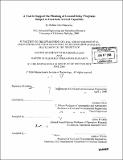A tool to support the planning of ground delay programs subject to uncertain arrival capacities
Author(s)
Hanowsky, Michael John
DownloadFull printable version (17.77Mb)
Other Contributors
Massachusetts Institute of Technology. Operations Research Center.
Advisor
Amedeo Odoni.
Terms of use
Metadata
Show full item recordAbstract
A prototype tool was developed to support the planning of ground delay programs (GDPs) under uncertainty. Planned hours in advance, GDPs are subject to significant arrival capacity uncertainty, which reduces their efficacy in defraying the high cost of airborne delays. The tool addresses this uncertainty by using a set of different possible arrival capacity profile forecasts and modeling the outcome of the program under each forecast. A variety of different metrics are developed based on these results, including both system-wide and flight specific forecasts of queue size and the evolution of delay over time. To allow air and ground delay to be considered simultaneously, a cost function that takes both into account is proposed. The tool also addresses the dynamic nature of a GDP by allowing the traffic manager to set a system time variable and model possible future decisions. Taken a step further, these projections can be used as part of a two-step model, which evaluates a program under the assumption that a traffic manager will revise the GDP at a later time, once additional information regarding arrival capacity forecasts has become available. Revising a program can significantly reduce its expected cost, but different programs may not respond in the same way to future revision and are likely to exhibit differing magnitudes of expected cost reduction. In fact, the best initial decision may be one that trades initial cost for the ability to revise the program more effectively in the future.
Description
Thesis (S.M.)--Massachusetts Institute of Technology, Dept. of Civil and Environmental Engineering; and, (S.M.)--Massachusetts Institute of Technology, Sloan School of Management, Operations Research Center, 2006. Page 133 blank. Includes bibliographical references (p. 131-132).
Date issued
2006Department
Massachusetts Institute of Technology. Department of Civil and Environmental Engineering; Massachusetts Institute of Technology. Operations Research Center; Sloan School of ManagementPublisher
Massachusetts Institute of Technology
Keywords
Civil and Environmental Engineering., Operations Research Center.